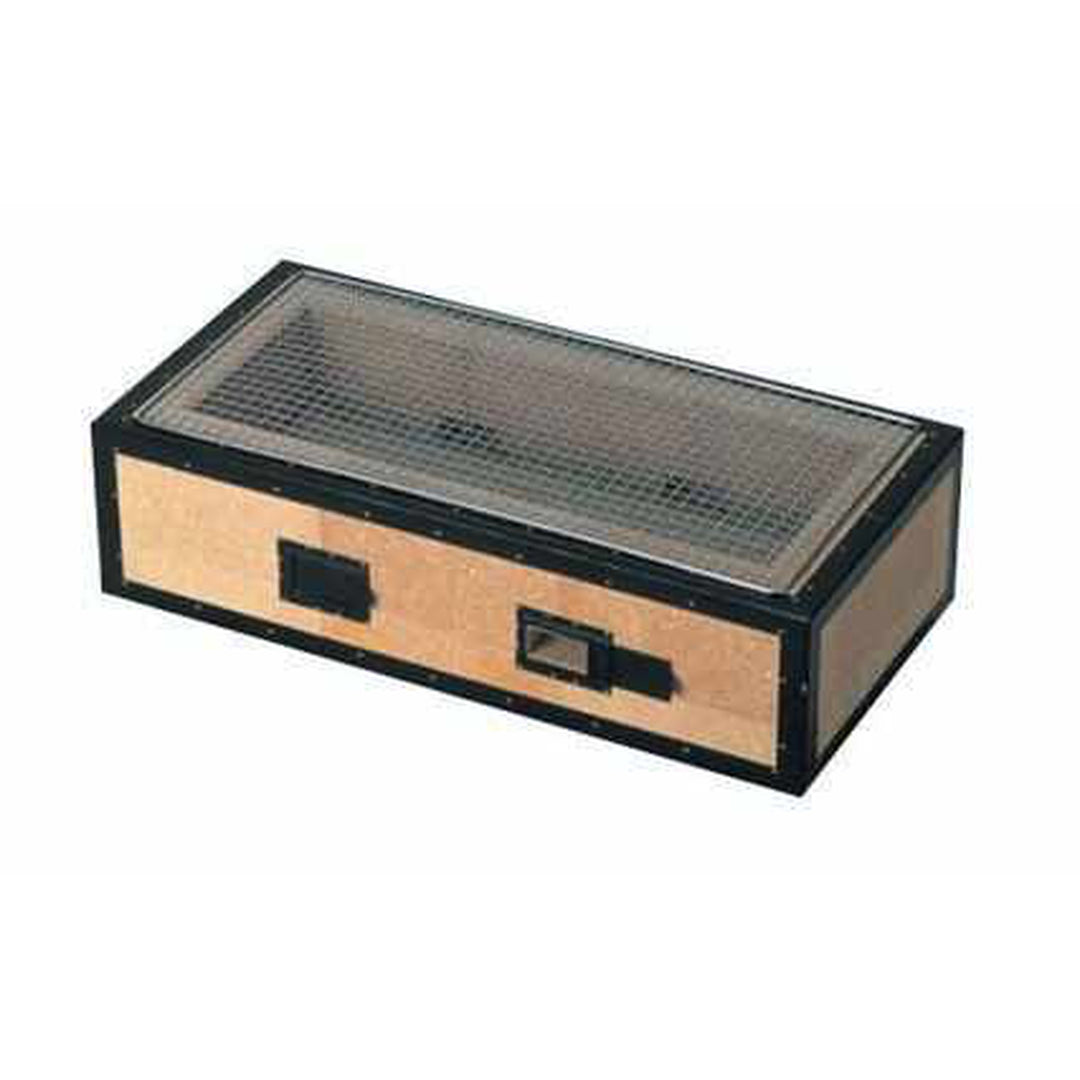
Handmade Konro Hibachi - Kon-7
- Free shipping on orders over R1250
- In stock, ready to ship
- Backordered, shipping soon
The most sought after Japanese grills! Some of the best chefs in the world in the top Michelin starred restaurant’s choose these Konro grills over any other cooking method. Also known as a “Hibachi” grill in the US, these grills can reach incredibly hot temperatures and stay hotter for longer.
Made from Diatomite (the fossilized remains of plankton) and mined traditionally by hand in Suzu Japan, the blocks are joined together without the use of mortar, for a stronger, tighter and more fire resistant finish. The Konro is then baked at 1,000 degrees for six hours making them extremely durable.
This handmade Konro grill is available in limited supply, please contact us here should you wish to reserve yours.
Made from Diatomite Blocks which are mined and assembled by hand these Japanese grills are the most sought after grills in the world.
This Konro-7 is extremely efficient and portable. Although you can use regular charcoal we suggest it is partnered with our binchotan charcoal which can be found on our Binchotan page. Binchotan charcoal is smell and smoke-free, burns for longer and creates even heat distribution.
For private or professional use.
Product Info
- Dimensions: 70cm x 35cm x 21cm
- Weight: 22kg
Use & Care Instructions: If using regular charcoal leave to burn out and cool then brush out ash. If using Binchotan charcoal remove the charcoal and store for next use. Never submerge your grill into water or get wet. (Binchotan charcoal is sold separately)
Underneath the vast sky and sparkling waters of the Sea of Japan lie rich deposits of diatomite, accumulated from long ages past when this was an inland sea. Suzu, the city at the tip of Noto peninsula in Ishikawa prefecture, draws on these siliceous fossil remains to produce lightweight, all-natural charcoal burners.
It’s a story that goes back some 20 million years or more, to the Miocene Epoch. Back then, the Sea of Japan was a landlocked body of water. Fed by thermal springs created by volcanic activity, it was an environment ripe for the growth of diatoms, a major group of single-celled planktonic algae. When an explosive bloom of them depleted nutrients in the water and blocked out the sunlight needed for photosynthesis, diatoms started to die off, their remains sinking to the seabed. Those deposits then fed a new generation, which led to another bloom, and so on. As theory has it, this oft-repeated cycle of planktonic boom and bust is what formed the massive strata of diatomaceous earth—also known as diatomite—now found in the area.
Consisting almost entirely of silica, these sedimentary deposits are characterized by their low density and high porosity. Diatomite’s excellent absorbency and insulating properties make it an ideal material for filters, heat-resistant bricks, and grills—and Suzu is a major production center for them all.
Situated at the northeastern tip of Noto peninsula, Suzu is in fact Japan’s largest producer of diatomite. The sedimentary deposit in the area is estimated to reach 5.1 billion cubic meters in volume; at its deepest point it extends as far as 400 meters below the ground.
Diatomite strata are not found by scientific measuring, but by information passed along by local elders who have long been in the business. Until the 1960s, hundreds of people were involved in diatomite mining in Suzu, but today only a few remain. Following the leads of veteran quarrymen, the mining company decides where to focus its operations. Because the quarries are so narrow, workers dig alone, carving their way through tunnels that can eventually stretch to as long as 500 meters.
Stacked piles of diatomite bricks move along a conveyor belt on their slow journey through the factory’s long kiln. Afterwards, a workman hits each fired piece with a hammer to judge by its sound whether there are any cracks within. Whereas some makers join bricks with mortar to form their cooking grills, at Kaginushi the workmen use carpentry skills to fit each unit together meticulously by hand, for a stronger, tighter, more fire- resistant product. Because diatomite grills have superior heat-insulation properties, charcoal used in them starts easily and burns longer than in conventional cookers.
FREE SHIPPING ON ALL ORDERS OVER R1250
We use a selection of reputable national courier companies for deliveries, depending on the delivery address. Your parcel should arrive within 3-5 working days of receipt of the order or POP, if an EFT. Rural delivery may take a little bit longer. We will always advise if there is an expected delay.
SOUTH AFRICA
All delivery costs for products delivered within South Africa are based on a flat rate fee, if under R1250 in retail value. R105 for within Cape Town and R120 for National. We also offer a Collection option which is free of charge.
Collection is from:
SETAMONO JAPANESE HOMEWARE - CAPE TOWN
The Courtyard, Shop 5
The Old Cape Quarter Lifestyle Village
De Waterkant, Corner of Dixon & Waterkant Street,
Cape Town, 8005, South Africa
((You can find us in the Courtyard, opposite Yoga Loft or beside Susu Bubble Tea and SHIFT Expresso Bar)
INTERNATIONAL
We do send orders internationally. Costs for international shipping will be based on specific location. For further information regarding our international freight costs, or if you have a specific enquiry, please email hello@setamonotableware.com
All goods are packaged very thoughtfully and with great care.

